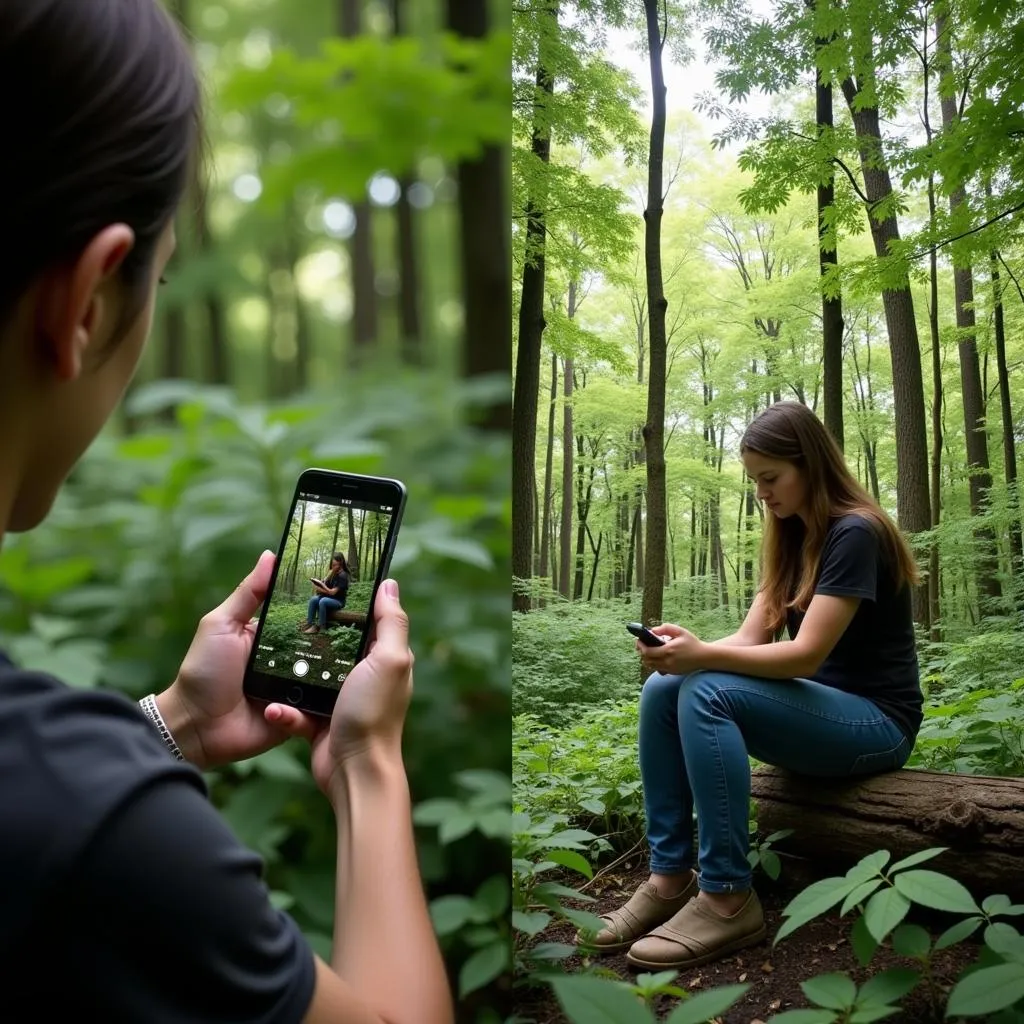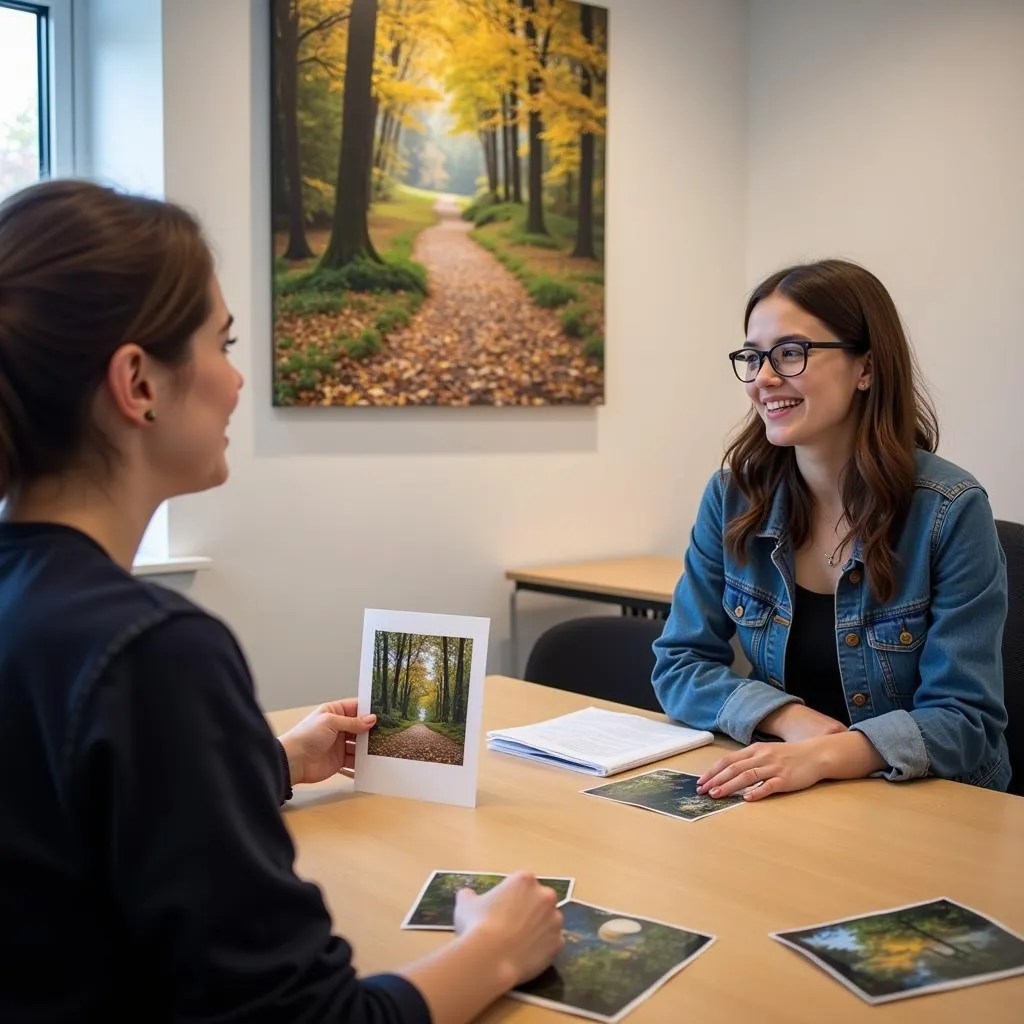Describing a place in nature that brings you peace is a common topic in IELTS Speaking tests. This theme allows candidates to showcase their vocabulary, fluency, and ability to express emotions while discussing environmental elements. Let’s explore how to excel in this speaking task and achieve a high band score.
Part 1: Introduction and Interview
In this section, the examiner may ask general questions about nature and relaxation. Here are some potential questions with sample answers:
- Do you enjoy spending time in nature?
Sample answer (Band 7-8):
“Absolutely! I find that immersing myself in natural surroundings is incredibly rejuvenating. Whether it’s a stroll through a local park or a weekend hike in the mountains, I always feel more centered and refreshed after spending time outdoors.”
- What kind of natural places do you have near your home?
Sample answer (Band 8-9):
“I’m fortunate to live in an area surrounded by diverse natural landscapes. Just a short drive from my home, there’s a picturesque lake fringed by lush forests, offering a serene escape from the hustle and bustle of city life. Additionally, we have rolling hills dotted with wildflowers in the spring, which create a breathtaking panorama and serve as a popular spot for nature enthusiasts and photographers alike.”
- How often do you visit natural places for relaxation?
Sample answer (Band 7-8):
“I make it a point to venture into nature at least once a week, typically on weekends. It’s become a vital part of my routine for maintaining mental well-being and finding balance in my hectic life. Even a brief visit to a nearby park can work wonders for my stress levels and overall mood.”
Describe the weather you like can also be an excellent way to discuss natural environments that bring you peace.
Part 2: Long Turn
Cue Card
Describe a place in nature that brings you peace
You should say:
- Where it is
- How you discovered it
- What you can see and do there
- And explain why this place brings you peace
Sample Answer (Band 8-9):
“I’d like to talk about a tranquil beach located on the eastern coast of my country, about a two-hour drive from my hometown. I stumbled upon this hidden gem quite serendipitously during a road trip with friends a few years ago.
This beach is a pristine stretch of golden sand that extends for miles, bordered by towering cliffs on one side and the vast expanse of the ocean on the other. The landscape is relatively untouched by human development, preserving its natural beauty.
When you visit, you’re greeted by the rhythmic sound of waves gently lapping against the shore, creating a soothing backdrop. The air is filled with the invigorating scent of sea salt, and on clear days, you can see the horizon seamlessly blending with the sky, creating an illusion of infinity.
There’s a multitude of activities to enjoy here. You can take long, contemplative walks along the shoreline, feeling the sand between your toes and collecting interesting seashells. For the more adventurous, there’s the option to explore the rock pools teeming with marine life during low tide. Surfing is also popular, with consistent waves attracting enthusiasts from far and wide.
This place brings me immense peace for several reasons. Firstly, its relative seclusion means it’s never overcrowded, allowing for genuine solitude and reflection. The vastness of the ocean provides perspective, making personal worries seem small in comparison. The natural rhythm of the tides and the constancy of the waves create a sense of timelessness that I find incredibly calming.
Moreover, being in this environment allows me to disconnect from technology and the demands of daily life, facilitating a mental reset. The simple act of watching the sun set over the water, painting the sky in vibrant hues, never fails to instill a sense of awe and gratitude.
In essence, this beach serves as my personal sanctuary, a place where I can find inner peace, reconnect with nature, and recharge my mental and emotional batteries.”
 Tranquil beach bringing peace and serenity
Tranquil beach bringing peace and serenity
Follow-up Questions
- How often do you visit this place?
Sample answer (Band 7-8):
“I try to visit this beach at least once every couple of months. It’s become a ritual of sorts, allowing me to recharge and recalibrate regularly. Even though it requires some planning due to the distance, I find the effort well worth it for the mental clarity and peace of mind it provides.”
- Has this place changed over time?
Sample answer (Band 8-9):
“Fortunately, this beach has remained relatively unchanged over the years, which is part of its charm. The local authorities have done an admirable job in preserving its natural state, implementing strict regulations to prevent overdevelopment. However, I’ve noticed a gradual increase in visitors, though it’s still far from being overcrowded. There have been some positive changes, such as improved access paths and the addition of discrete waste management facilities, which help maintain the area’s pristine condition without detracting from its natural beauty.”
Part 3: Two-way Discussion
- Why do you think some people prefer natural environments for relaxation?
Sample answer (Band 8-9):
“There are several compelling reasons why individuals gravitate towards natural settings for relaxation. Firstly, nature provides a stark contrast to the artificial environments we often find ourselves in, offering a much-needed respite from the constant stimulation of urban life. The absence of man-made noise and the presence of natural sounds like birdsong or rustling leaves can have a profoundly calming effect on our nervous system.
Moreover, spending time in nature has been scientifically proven to reduce stress hormones like cortisol and increase the production of feel-good neurotransmitters. This physiological response translates to improved mood and reduced anxiety. Natural environments also tend to encourage mindfulness and present-moment awareness, allowing individuals to temporarily disconnect from their worries and engage fully with their surroundings.
Additionally, the aesthetic beauty of natural landscapes can evoke feelings of awe and wonder, which are powerful emotion states associated with increased life satisfaction and well-being. The changing patterns of light, the intricate details of plants and animals, and the grand scale of natural formations all contribute to a sense of being part of something larger than oneself, which can be deeply comforting and put personal problems into perspective.”
- Do you think urban areas should incorporate more natural elements? Why or why not?
Sample answer (Band 7-8):
“Absolutely, I believe integrating more natural elements into urban areas is crucial for several reasons. Firstly, it can significantly improve the quality of life for city dwellers by providing accessible green spaces for relaxation and recreation. Parks, tree-lined streets, and rooftop gardens can act as urban oases, offering respite from the concrete jungle.
Moreover, incorporating nature into cities has tangible environmental benefits. Green spaces can help mitigate the urban heat island effect, improve air quality by filtering pollutants, and provide habitats for local wildlife, thus promoting biodiversity. From a mental health perspective, exposure to nature in urban settings has been linked to reduced stress levels and improved cognitive function.
However, it’s important to acknowledge the challenges in implementing such initiatives, including limited space and budget constraints. Despite these hurdles, I believe the long-term benefits to public health, environmental sustainability, and overall urban livability far outweigh the initial investments required.”
Describe a favorite place in your city could be an interesting way to discuss how urban areas can incorporate natural elements for relaxation.
- How do you think technology affects our connection with nature?
Sample answer (Band 8-9):
“The relationship between technology and our connection to nature is complex and multifaceted. On one hand, technology has the potential to distance us from nature by keeping us indoors and glued to screens, leading to what some researchers call ‘nature deficit disorder’. The constant connectivity and information overload facilitated by smartphones and the internet can make it challenging to fully immerse ourselves in natural environments when we do venture outdoors.
Conversely, technology can also enhance our appreciation and understanding of nature in unprecedented ways. Apps for identifying plants and animals, GPS tracking for hiking, and high-quality cameras on smartphones allow us to engage with nature more deeply and share our experiences with others. Virtual reality and augmented reality technologies are even being used to bring nature experiences to those who might not have physical access to certain environments.
Furthermore, technology plays a crucial role in conservation efforts, from satellite tracking of endangered species to sophisticated data analysis for climate change research. Social media platforms have also been instrumental in raising awareness about environmental issues and mobilizing support for conservation initiatives.
Ultimately, I believe the key lies in striking a balance. We should harness technology as a tool to enhance our connection with nature rather than allowing it to become a substitute for real-world experiences. This might involve using apps to plan outdoor activities, learn about local ecosystems, or participate in citizen science projects, while also being mindful of setting boundaries to ensure we’re fully present when in natural settings.”
 Balancing technology and nature connection
Balancing technology and nature connection
Key Vocabulary and Phrases for High Scores
-
Serene escape (adjective + noun): A peaceful and calm getaway
Example: The hidden lake provided a serene escape from the city’s chaos. -
Breathtaking panorama (adjective + noun): An incredibly beautiful wide view
Example: From the hilltop, we were treated to a breathtaking panorama of the valley below. -
Pristine stretch (adjective + noun): An unspoiled or untouched area
Example: The beach was a pristine stretch of white sand, unmarred by human activity. -
Invigorating scent (adjective + noun): A refreshing and energizing smell
Example: The invigorating scent of pine filled the air as we hiked through the forest. -
Mental reset (adjective + noun): A process of clearing and refreshing one’s mind
Example: Spending a weekend in nature provided the mental reset I desperately needed. -
To disconnect from technology (phrase): To stop using electronic devices temporarily
Example: During my camping trip, I decided to disconnect from technology completely. -
Aesthetic beauty (adjective + noun): Visual attractiveness or appeal
Example: The aesthetic beauty of the sunset over the mountains left us in awe. -
Urban oasis (adjective + noun): A peaceful, natural area within a city
Example: The botanical garden serves as an urban oasis for city dwellers seeking tranquility.
Describe a place in your city where people go to relax can be a great opportunity to use some of these phrases in context.
Examiner’s Advice
To achieve a high score in the IELTS Speaking test when describing a place in nature that brings you peace:
-
Use a wide range of vocabulary related to nature, emotions, and sensory experiences. Practice incorporating less common words and phrases to demonstrate lexical resource.
-
Focus on providing detailed descriptions that engage all senses. This shows your ability to communicate ideas fluently and coherently.
-
Structure your response logically, using appropriate discourse markers to connect ideas smoothly.
-
Include personal anecdotes or experiences to make your answer more authentic and engaging.
-
Practice speaking about various natural settings to be prepared for any related questions.
-
Work on your pronunciation and intonation to ensure clarity and natural-sounding speech.
-
Be prepared to discuss broader topics related to nature, such as environmental conservation or the benefits of spending time outdoors.
Remember, regular practice is key to improving your speaking skills. Consider recording yourself and listening back to identify areas for improvement. Describe a park or recreational area that you wish to visit can be an excellent exercise to expand your nature-related vocabulary and practice descriptive language.
 IELTS speaking practice session
IELTS speaking practice session
By following these guidelines and consistently practicing, you’ll be well-prepared to excel in describing a place in nature that brings you peace during your IELTS Speaking test. Remember, authenticity in your responses combined with a strong command of English will help you achieve the best possible score.
Describe a place in the mountains where you would like to go can be another excellent topic to practice your descriptive skills and nature-related vocabulary.


